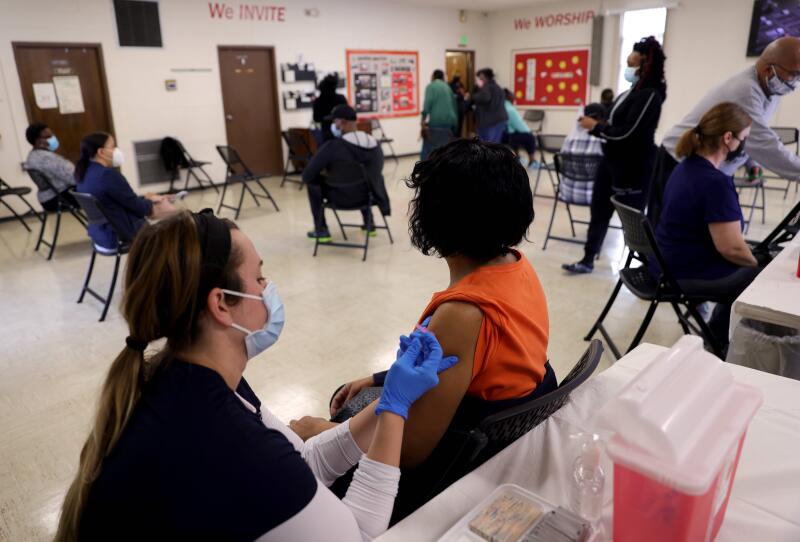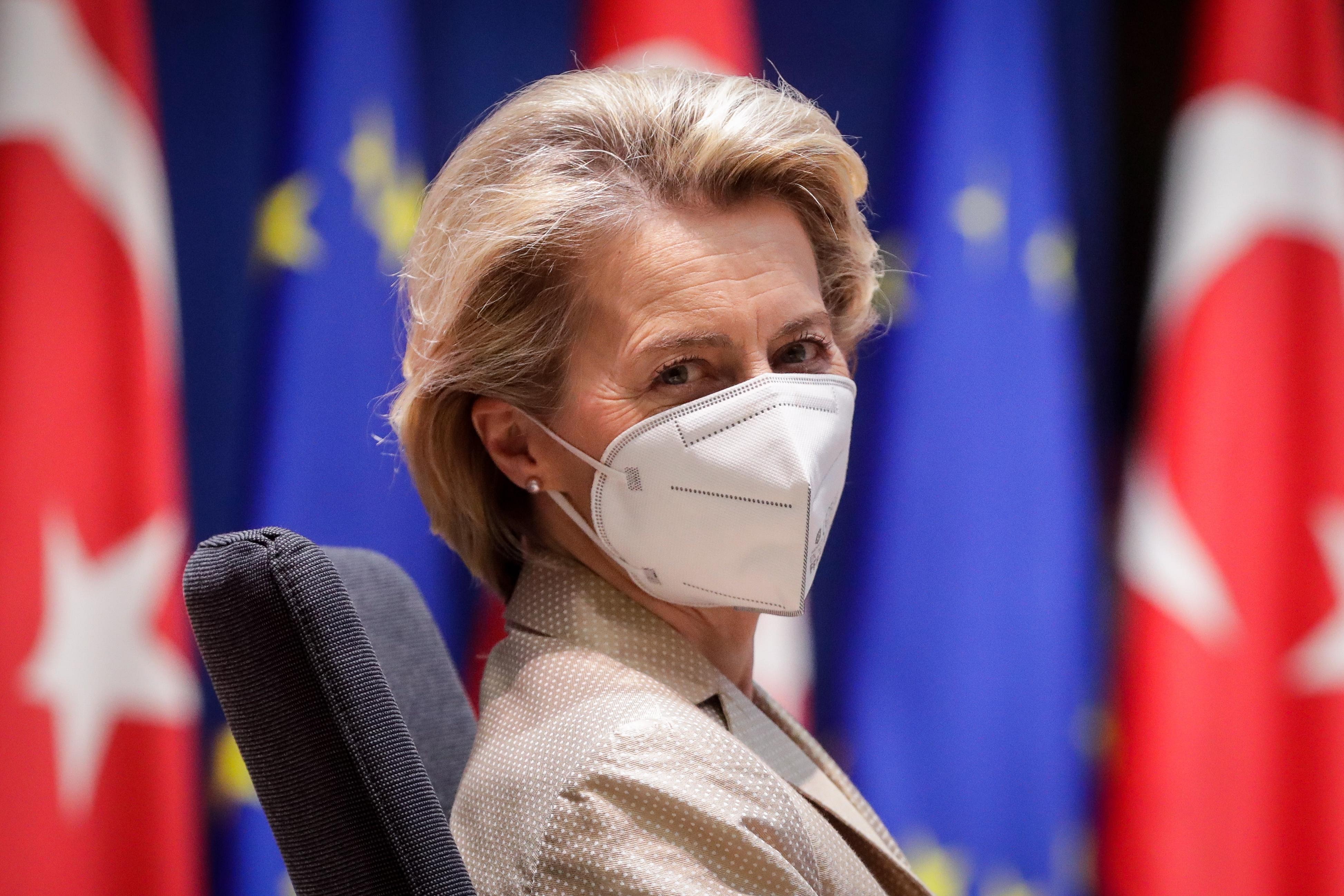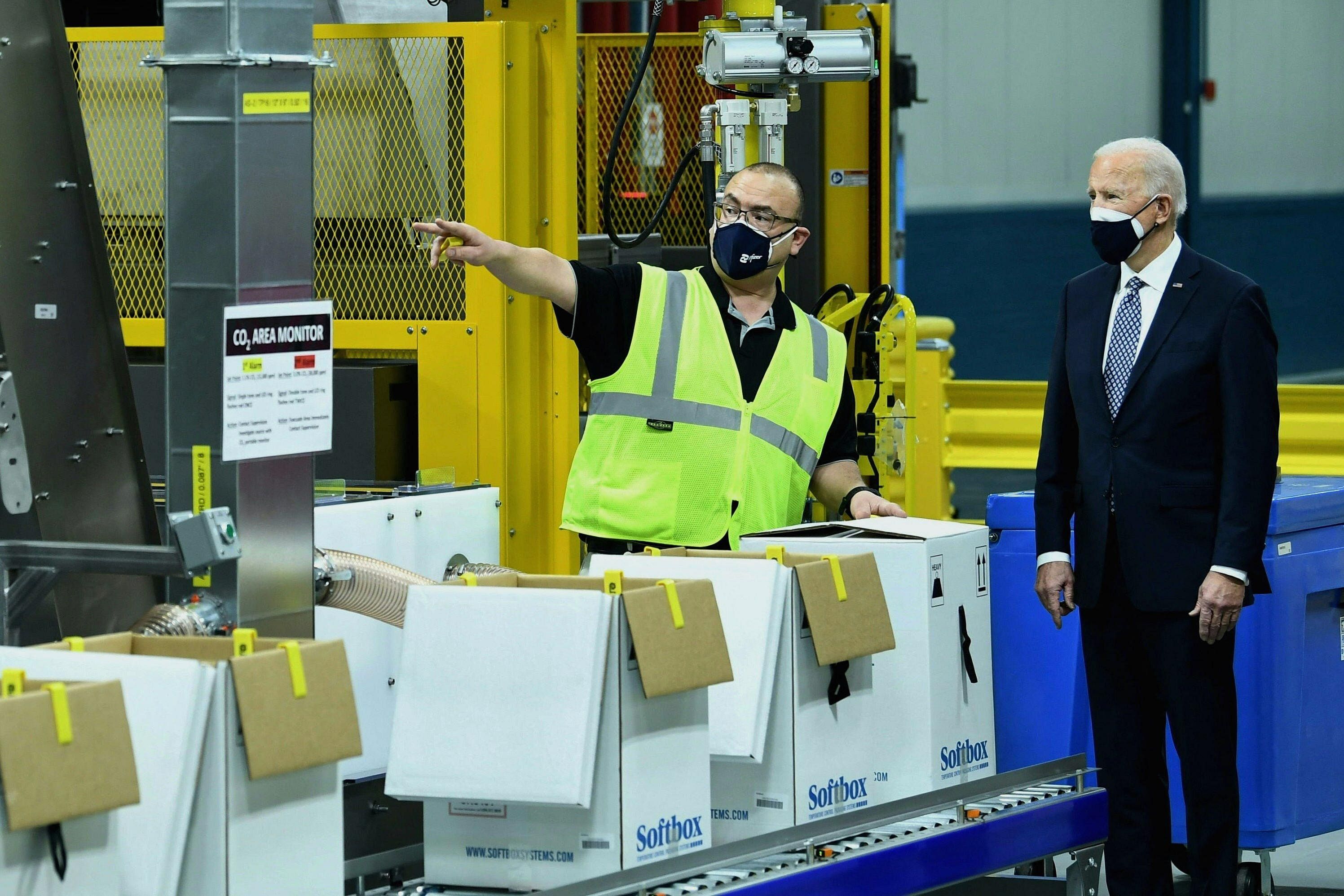Biden uses Trump's 'America First' vaccine plan to corner market
Sign up now: Get ST's newsletters delivered to your inbox

The US has injected more than a quarter of the world's coronavirus vaccine doses so far.
PHOTO: AFP
WASHINGTON (BLOOMBERG) - The US has injected more than a quarter of the world's coronavirus vaccine doses so far, thanks to two presidents who share little except a strategy to corner domestic production of shots, employing a 70-year-old law that has so far prevented exports.
From the moment the Food and Drug Administration (FDA) authorised the first vaccines by Pfizer and Moderna, the US government, first under Mr Donald Trump and then under President Joe Biden, had already arranged to buy all of the companies' known US production for months to come, assuring hundreds of millions of doses for American arms.
Countries without their own capacity to manufacture vaccines have had to wait or turn to sources other than the US, including shots developed in Russia and China under less regulatory scrutiny.
Mr Biden last week marked a milestone of 100 million shots administered under his presidency, six weeks ahead of schedule.
The US has now put nearly 130 million doses into arms, twice as many as the more populous European Union.
The achievement is due to contracts that obligate manufacturers to fill massive US government orders first, a de facto ban on vaccine exports despite Biden administration officials repeatedly saying there is no formal prohibition.
In exchange, companies get crucial aid procuring supplies. The nationalist approach taken by both Mr Biden and Mr Trump has been criticised by some allies and public health experts.
"It, depressingly, has gone pretty much exactly as predicted," said Mr Thomas Bollyky, director of the global health programme at the Council on Foreign Relations.
"In every previous global health crisis where there has been a medical intervention that would make a difference, wealthy countries have hoarded it."
But other countries will soon benefit. The US is on pace to inoculate most of its adult population by summer and is poised within months to become the biggest vaccine exporter in the world.
As production increases, domestic manufacturers may be able to soon fulfil their US contracts while also using making doses for other countries.
The European Union is now drafting similar measures to curb exports to boost supply at home.
Americans first
Both Mr Biden and Mr Trump have been unapologetic that they have aimed to vaccinate Americans first.
Trump administration officials say American taxpayers deserved to have their orders prioritised because of the former president's multi-billion-dollar "Operation Warp Speed" programme that hastened the development of coronavirus vaccines.
"We didn't want to put billions of dollars of taxpayers' money at risk only to find out we were third in line for the product we invested in," said Mr Paul Mango, a former senior official in the Department of Health and Human Services under Mr Trump.
The former administration wrote clauses into contracts with manufacturers and also used the Defence Production Act (DPA), which grants the president extraordinary powers over manufacturing in times of crisis, to prioritise US orders.
"We were giving them dollars before they had a product," Mr Mango said.
Under Mr Biden, officials managing the vaccine roll-out are not so blunt, but the sentiment has hardly changed.
The new President has not rescinded a Trump executive order that declared Americans would be first in line for US-made vaccines, followed by allies.
And the same tools the Trump administration used to keep domestically produced vaccines within the nation's borders have been employed by Mr Biden's team - chiefly, a provision of the DPA that allows the US to assign its orders "priority" over others.
The law dates to the Korean War.
The American approach contrasts with the EU, which has exported doses, including some to the US, even as it sought to vaccinate its own people.
But under growing criticism for a vaccination campaign that has badly lagged the US and Britain, European Commission President Ursula von der Leyen last week proposed using emergency powers similar to the US production law to keep shots in EU countries.
The EU is set to unveil new rules on Wednesday (March 24) that may limit future vaccine exports by blocking shipments if manufacturers have not met their European commitments.
The EU, Canada and Mexico have all asked the US for help, and to particularly consider sharing doses of a vaccine its own FDA has not yet authorised, made by AstraZeneca.
The White House said last week it would "loan" four million doses to its two North American neighbours, the first known US exports.

Mexico has given enough shots for 2.2 per cent of its population, compared with 5.6 per cent in Canada and 19.7 per cent in the US, according to the Bloomberg Vaccine Tracker.
Mr Biden would face an outcry if he allowed US manufacturers to export doses while domestic demand still far exceeds supply.
"The bottom line is that, politically, the Biden administration is in a tough spot if they're going to try to start providing extra doses" before Americans are widely vaccinated, said Dr Jennifer Kates, senior vice-president at the Kaiser Family Foundation, a nonprofit health research group.
Contracts, priority ratings
The US government has not released its contracts with vaccine manufacturers in full, but clauses in the unredacted portions suggest an emphasis on domestic production and exclusivity.
"It is critical that the vaccine be produced in the United States. Domestic production of the vaccine is the only assurance that Americans will have access to the finished product," reads one contract with Moderna, which was a full participant in "Operation Warp Speed".
The contract also includes a clause with a blacked-out reference to "rights of first refusal".
A contract with Pfizer, heavily redacted, similarly indicates it is crucial that "domestic manufacturing" supply US doses.
The DPA provides the government even more power to corner vaccine supplies.
The law allows the US to slap what is called a "priority rating" on contracts, which moves the government to the front of a line, but also usually gives the manufacturer better access to supplies they need.
The US applied priority ratings to its contracts with both Moderna and Johnson & Johnson a month after signing them in August, according to the Department of Health and Human Services.
The designation meant the companies had to fill their US orders before those from other countries.
AstraZeneca's US contract also included a priority rating.
Pfizer's initial contract did not include a DPA priority rating, but the contract language required the company to provide 20 million doses to the US monthly, beginning in November, Trump officials said.
Early shipments fell short of forecasts, but the deal also included a clause that said all timing estimates were "subject to change based on emerging data, regulatory guidance, and manufacturing and technical developments, among other risks".
A second contract the Trump administration signed with Pfizer, raising the US's total order to 200 million doses, included a priority rating that the company requested, an indication it was willing to put US orders at the front of the line in order to benefit from the government's power to secure scarce supplies.
Spokesmen for Pfizer, Moderna and Johnson & Johnson all declined to comment on their export plans.
"Any questions about exports restrictions need to be addressed by the US government," Pfizer spokesman Sharon Castillo said.
The company has shipped 82 million doses from its US plants as at March 23.
Spokesmen for Mr Biden's White House declined to comment.
Supply the world

The government has leaned on the DPA to hasten vaccine production in other ways, for example by financing expansions of production lines or awarding contracts to suppliers.
In other cases, the mere threat of using war powers against manufacturers has been enough to get companies to do what the government wants, two officials said.
"The powers are quite broad," said Mr Craig Fugate, a former Federal Emergency Management Agency Administrator (FEMA) under former president Barack Obama.
"They also literally have the power to say to some place: 'you're going to make this, not that.'"
FEMA frequently relies on the DPA in its responses to natural disasters.
After he took office, Mr Biden placed a third order of 100 million doses each on Moderna and Pfizer. Mr Biden also announced a priority rating for Pfizer.
Mr Biden announced this month he would order another 100 million doses of J&J's single-dose vaccine, doubling the US total; the government and the company remain in talks on terms of the deal.
Altogether, the US government has placed orders for enough vaccines to inoculate its entire adult population nearly twice over.
White House press secretary Jen Psaki has said that the administration wants the surplus in case scientists determine that booster shots are needed to combat variants or the FDA authorises a shot for children.
The Biden administration will not say whether any domestic production has gone to other countries. But contract terms with manufacturers and delivery totals suggest that all, or nearly all, US-made shots so far have gone to the US government.
The American vaccine wealth holds the promise of supplying the world.
"Because we're building such robust capacity, when we get our vaccines done, we're going to be able to be a rather significant player in getting proven vaccines out in the international market," Mr Fugate said.
It is not a matter of charity, he said: "Until you vaccinate everybody, including your enemies, we're not safe from Covid."


